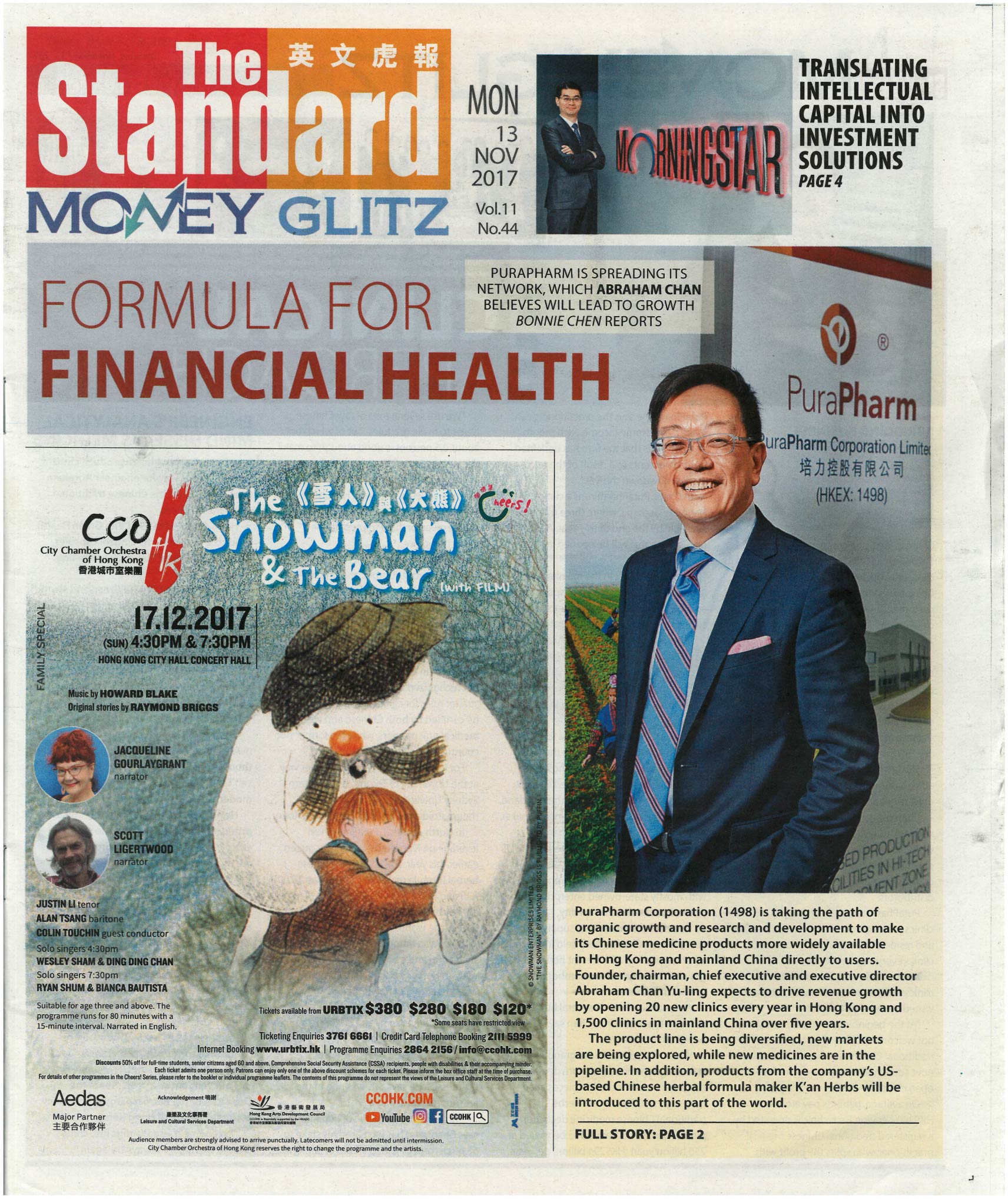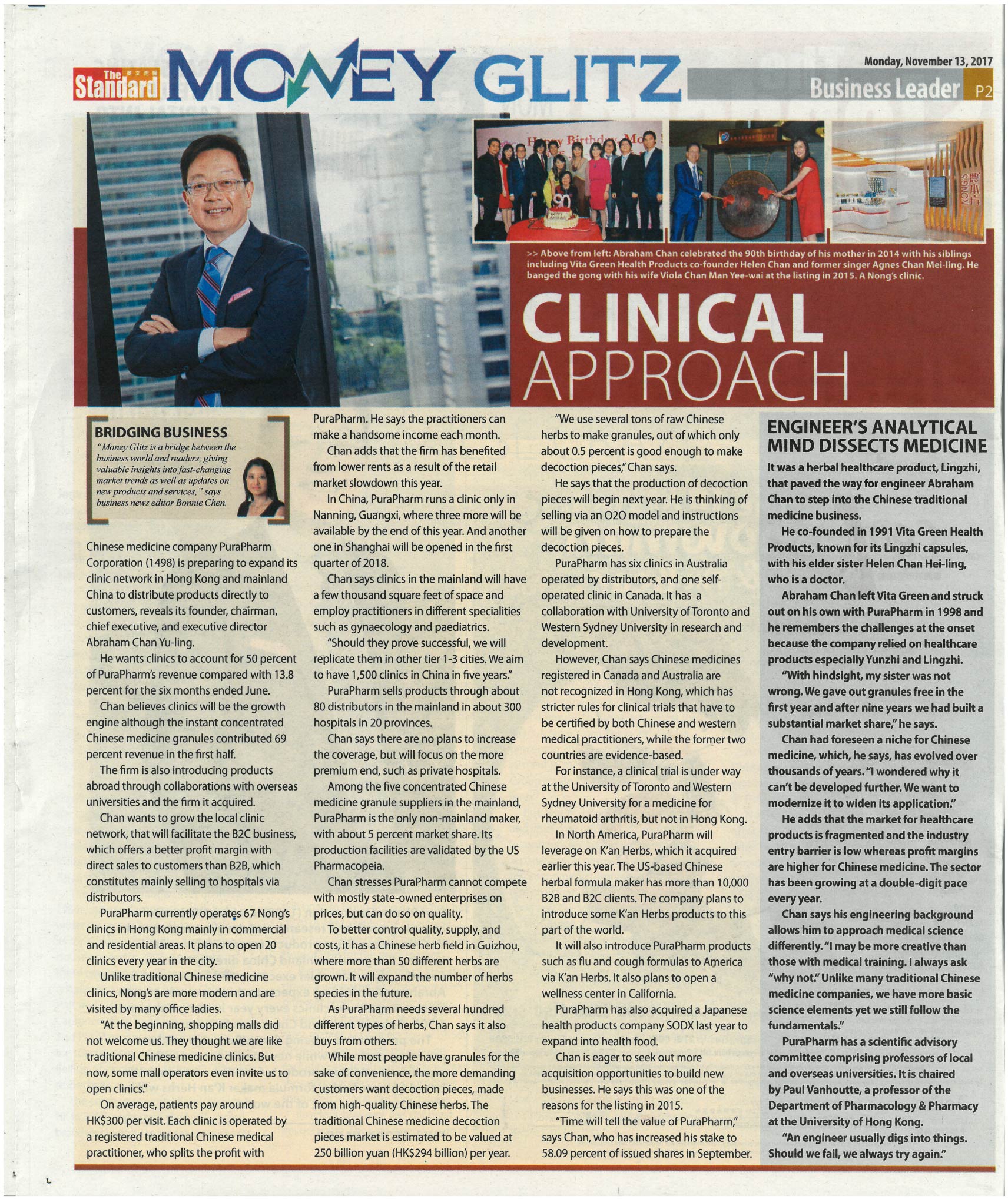英文虎報:跟培力藥業集團 (1498) 主席陳宇齡先生的訪問
2017年11月13日
The Standard: Formula for Financial Health – PuraPharm is spreading its network, which Abraham Chan believes will lead to growth.
本新聞報導只提供英文版本
MONEY GLITZ
FORMULA FOR FINANCIAL HEALTH
PURAPHARM IS SPREADING ITS NETWORK, WHICH ABRAHAM CHAN BELIEVES WILL LEAD TO GROWTH
BONNIE CHEN REPORTS
PuraPharm Corporation (1498) is taking the path of organic growth and research and development to make its Chinese medicine products more widely available in Hong Kong and mainland China directly to users. Founder, chairman, chief executive and executive director Abraham Chan Yu-ling expects to drive revenue growth by opening 20 new clinics in mainland every year in Hong Kong and 1,500 clinics in mainland China over five years.
The product line is being diversified, new markets are being explored, while new medicines are in the pipeline. In addition, products from the company’s US-based Chinese herbal formula maker K’an Herbs will be introduced to this part of the word.
Clinical approach
Chinese medicine company PuraPharm Corporation (1498) is preparing to expand its clinic network in Hong Kong and mainland China to distribute products directly to customers, reveals its founder, chairman, chief executive, and executive director Abraham Chan Yu-ling.
He wants clinics to account for 50 percent of PuraPharm’s revenue compared with 13.8 percent for the six months ended June.
Chan believes clinics will be the growth engine although the instant concentrated Chinese medicine granules contributed 69 percent revenue in the first half.
The firm is also introducing products abroad through collaborations with overseas universities and the firm it acquired.
Chan wants to grow the local clinic network, that will facilitate the B2C business, which offers a better profit margin with direct sales to customers than B2B, which constitutes mainly selling to hospitals via distributors.
PuraPharm currently operates 67 Nong’s clinics in Hong Kong mainly in commercial and residential areas. It plans to open 20 clinics every year in the city.
Unlike traditional Chinese medicine clinics, Nong’s are more modern and are visited by many office ladies.
“At the beginning, shopping malls did not welcome us. They thought we are like traditional Chinese medicine clinics. But now, some mall operators even invite us to open clinics.”
On average, patients pay around HK$300 per visit. Each clinic is operated by a registered traditional Chinese medical practitioner, who splits the profit with PuraPharm. He says the practitioners can make a handsome income each month.
Chan adds that the firm has benefited from lower rents as a result of the retail market slowdown this year.
In China, PuraPharm runs a clinic only in Nanning, Guangxi, where three more will be available by the end of this year. And another one in Shanghai will be opened in the first quarter of 2018.
Chan says clinics in the mainland will have a few thousand square feet of space and employ practitioners in different specialities such as gynaecology and paediatrics.
“Should they prove successful, we will replicate them in other tier 1-3 cities. We aim to have 1,500 clinics in China in five years.”
PuraPharm sells products through about 80 distributors in the mainland in about 300 hospitals in 20 provinces.
Chan says there are no plans to increase the coverage, but will focus on the more premium end, such as private hospitals.
Among the five concentrated Chinese medicine granule suppliers in the mainland, PuraPharm is the only non-mainland maker, with about 5 percent market share. Its production facilities are validated by the US Pharmacopeia.
Chan stresses PuraPharm cannot compete with mostly state-owned enterprises on prices, but can do so on quality.
To better control quality, supply, and costs, it has a Chinese herb field in Guizhou, where more than 50 different herbs are grown. It will expand the number of herbs species in the future.
As PuraPharm needs several hundred different types of herbs, Chan says it also buys from others.
While most people have granules for the sake of convenience, the more demanding customers want decoction pieces, made from high-quality Chinese herbs. The traditional Chinese medicine decoction pieces market is estimated to be valued at 250 billion yuan (HK$294 billion) per year.
“We use several tons of raw Chinese herbs to make granules, out of which only about 0.5 percent is good enough to make decoction pieces,” Chan says.
He says that the production of decoction pieces will begin next year. He is thinking of selling via an O2O model and instructions will be given on how to prepare the decoction pieces.
PuraPharm has six clinics in Australia operated by distributors, and one self-operated clinic in Canada. It has a collaboration with University of Toronto and Western Sydney University in research and development.
However, Chan says Chinese medicines registered in Canada and Australia are not recognized in Hong Kong, which has stricter rules for clinical trials that have to be certified by both Chinese and western medical practitioners, while the former two countries are evidence-based.
For instance, a clinical trial is under way at the University of Toronto and Western Sydney University for a medicine for rheumatoid arthritis, but not in Hong Kong.
In North America, PuraPharm will leverage on K’an Herbs, which it acquired earlier this year. The US-based Chinese herbal formula maker has more than 10,000 B2B and B2C clients. The company plans to introduce some K’an Herbs products to this part of the world.
It will also introduce PuraPharm products such as flu and cough formulas to America via K’an Herbs. It also plans to open a wellness center in California.
PuraPharm has also acquired a Japanese health products company SODX last year to expand into health food.
Chan is eager to seek out more acquisition opportunities to build new businesses. He says this was one of the reasons for the listing in 2015.
“Time will tell the value of PuraPharm,” says Chan, who has increased his stake to 58.09 percent of issued shares in September.
Engineer’s analytical mind dissects medicine
It was a herbal healthcare product, Lingzhi, that paved the way for engineer Abraham Chan to step into the Chinese traditional medicine business.
He co-founded in 1991 Vita Green Health Products, known for its Lingzhi capsules, with his elder sister Helen Chan Hei-ling, who is a doctor.
Abraham Chan left Vita Green and struck out on his own with PuraPharm in 1998 and he remembers the challenges at the onset because the company relied on healthcare products especially Yunzhi and Lingzhi.
“With hindsight, my sister was not wrong. We gave out granules free in the first year and after nine years we had built a substantial market share,” he says.
Chan had foreseen a niche for Chinese medicine, which, he says, has evolved over thousands of years. “I wondered why it can’t be developed further. We want to modernize it to widen its application.”
He adds that the market for healthcare products is fragmented and the industry entry barrier is low whereas profit margins are higher for Chinese medicine. The sector has been growing at a double-digit pace every year.
Chan says his engineering background allows him to approach medical science differently. “I may be more creative than those with medical training. I always ask “why not.” Unlike many traditional Chinese medicine companies, we have more basic science elements yet we still follow the fundamentals.”
PuraPharm has a scientific advisory committee comprising professors of local and overseas universities. It is chaired by Paul Vanhoutte, a professor of the Department of Pharmacology & Pharmacy at the University of Hong Kong.
“An engineer usually digs into things. Should we fail, we always try again.”

